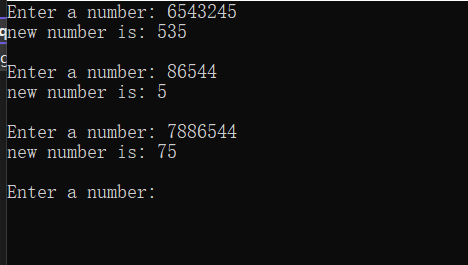#include <stdio.h> #include <stdlib.h> #include <time.h> #include <windows.h> #define N 80 void print_text(int line, int col, char text[]); // 函数声明 void print_spaces(int n); // 函数声明 void print_blank_lines(int n); // 函数声明 int main() { int line, col, i; char text[N] = "hi, April~"; srand(time(0)); // 以当前系统时间作为随机种子 for(i = 1; i <= 10; ++i) { line = rand() % 25; col = rand() % 80; print_text(line, col, text); Sleep(1000); // 暂停1000ms } return 0; } // 打印n个空格 void print_spaces(int n) { int i; for(i = 1; i <= n; ++i) printf(" "); } // 打印n行空白行 void print_blank_lines(int n) { int i; for(i = 1; i <= n; ++i) printf("\n"); } // 在第line行第col列打印一段文本 void print_text(int line, int col, char text[]) { print_blank_lines(line-1); // 打印(line-1)行空行 print_spaces(col-1); // 打印(col-1)列空格 printf("%s", text); // 在第line行、col列输出text中字符串 }
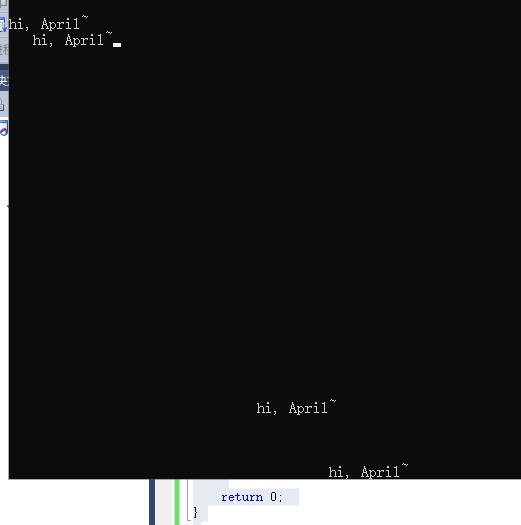
2.1
#include <stdio.h> #include<stdlib.h> long long fac(int n); // 函数声明 int main() { int i, n; printf("Enter n: "); scanf("%d", &n); for (i = 1; i <= n; ++i) printf("%d! = %lld\n", i, fac(i)); system("pause"); return 0; } // 函数定义 long long fac(int n) { static long long p = 1; printf("p = %lld\n", p); p = p * n; return p; }

2.2
#include <stdio.h> #include <stdlib.h> int func(int, int); // 函数声明 int main() { int k = 4, m = 1, p1, p2; p1 = func(k, m); // 函数调用 p2 = func(k, m); // 函数调用 printf("%d, %d\n", p1, p2); system("pause"); return 0; } // 函数定义 int func(int a, int b) { static int m = 0, i = 2; i += m + 1; m = i + a + b; return m; }

3
#include <stdio.h> #include<stdlib.h> long long func(int n); // 函数声明 int main() { int n; long long f; while (scanf("%d", &n) != EOF) { f = func(n); // 函数调用 printf("n = %d, f = %lld\n", n, f); } return 0; } long long func(int n) { static int i = 1; if (n == 0) { i = 1; return 1; } else { if (i) { i = 0; return 2 * func(n - 1) - 1; } else { i = 0; return 2 * func(n - 1); } } }

4
#include <stdio.h> int func(int n, int m); int main() { int n, m; while (scanf("%d%d", &n, &m) != EOF) printf("n = %d, m = %d, ans = %d\n", n, m, func(n, m)); return 0; } int func(int n, int m) { if (n == m||m==0) return 1; else if (n < m) return 0; else return func(n - 1, m) + func(n - 1, m - 1); }

5.1
#include <stdio.h> double mypow(int x, int y); // 函数声明 int main() { int x, y; double ans; while (scanf("%d%d", &x, &y) != EOF) { ans = mypow(x, y); // 函数调用 printf("%d的%d次方: %g\n\n", x, y, ans); } return 0; } double mypow(int x, int y) { double c, d; d = 1; if(y>=0) for (c = 1; c <= y;c++) { d *= x; } else for (c = -1; c >= y; c--) { d /= x; } return d; }
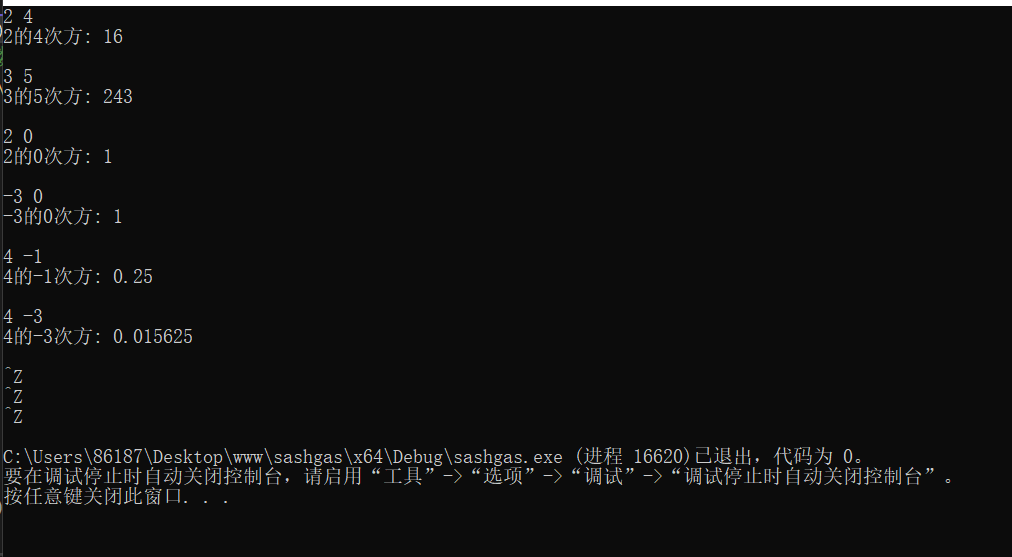
5.2
#include <stdio.h> double mypow(int x, int y); // 函数声明 int main() { int x, y; double ans; while (scanf("%d%d", &x, &y) != EOF) { ans = mypow(x, y); // 函数调用 printf("%d的%d次方: %g\n\n", x, y, ans); } return 0; } double mypow(int x, int y) { if (y > 0) return x * mypow(x, y - 1); else if (y < 0) return mypow(x, y + 1) / x; else return 1; }
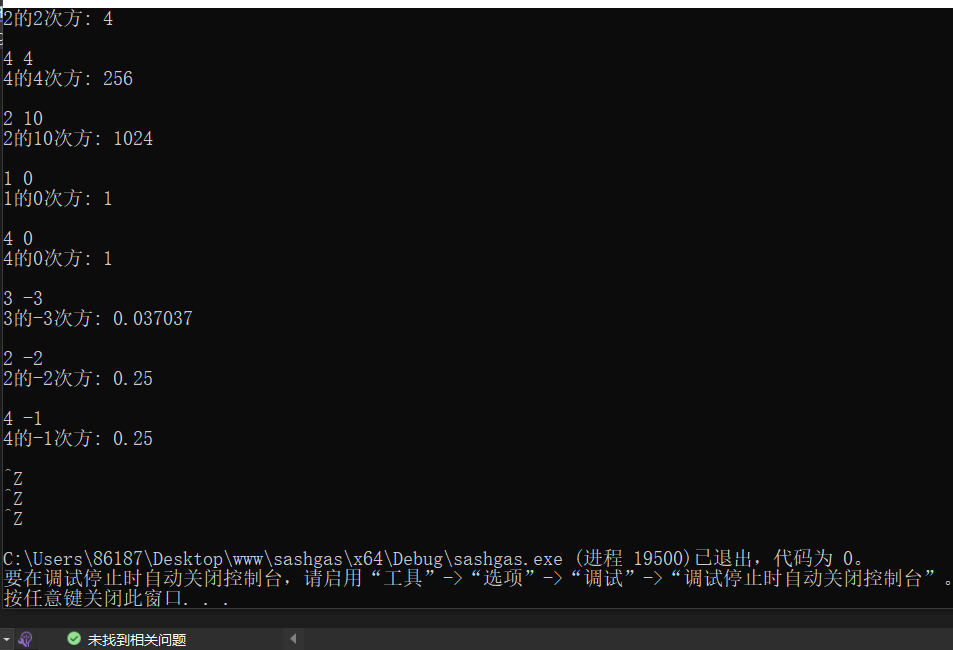
6
#include <stdio.h> #include<stdlib.h> void hanoi(unsigned int n, char from, char temp, char to); void moveplate(unsigned int n, char from, char to); int ans = 0; int main() { unsigned int n; while (scanf("%u", &n) != EOF) { hanoi(n, 'A', 'B', 'C'); printf("一共移动了%d次\n", ans); } return 0; } void hanoi(unsigned int n, char from, char temp, char to) { if (n == 1) moveplate(n, from, to); else { hanoi(n - 1, from, to, temp); moveplate(n, from, to); hanoi(n - 1, temp, from, to); } } void moveplate(unsigned int n, char from, char to) { printf("%u:%c-->%c\n", n, from, to); ans += 1; }
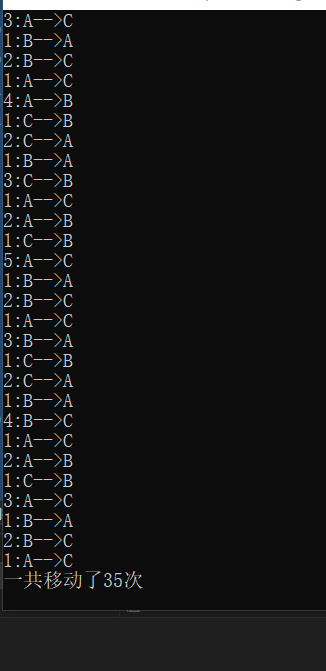
7
#include <stdio.h> #include<stdlib.h> #include<math.h> is_prime(int n); int main() { int a,n,t; for (a = 4; a <= 20;a += 2) { for (n = 2,t = 1; n <= a/2; n++) { if (is_prime(n) && is_prime(a - n) && t) { printf("%d=%d+%d\n", a, n, a - n); t = 0; } } } return 0; } is_prime(int n) { int p; if (n == 1) return 0; if (n == 2) return 1; for (p = 2;p <= sqrt(n); p++) if (n% p == 0) return 0; return 1; }

8
#include <stdio.h> #include <math.h> long func(long s); int main() { long s, t; printf("Enter a number: "); while (scanf("%ld", &s) != EOF) { t = func(s); printf("new number is: %ld\n\n", t); printf("Enter a number: "); } return 0; } long func(long s) { if (s == 0) return 0; if (s % 10 % 2 == 1) return 10 * func(s / 10) + s % 10; else return func(s / 10); }
